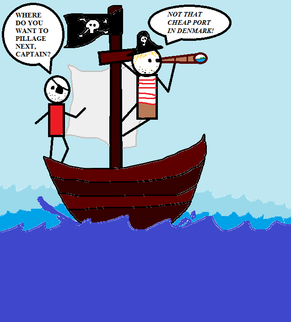|
By comparing the real estate value and populations of New York City and Copenhagen, I'm estimating the value of the latter's real estate at above $500 million. That's certainly not cheap, right? Well, etymologically speaking, it is. Copenhagen in English comes from the German translation of the Danish word Kobenhavn. This portmanteau, originally meaning "cheap harbor", is a combination of the word kober ("merchant") and havn ("port"). Kober stems from kobmand, itself an amalgamation, this of kobe ("buy") and mand ("man"). Kobe, through Norse kaupa and Proto-Germanic kaupoz, consistently meant "trade" in its known existence. Further back, it is theorized to have come from the Latin word caupo, meaning "tradesman". If this is true, its origins reach as far as the Proto-Indo-European word kwreyh, or "to buy". Mand is a cognate of the English word man, and can also be traced through Norse and Proto-Germanic to PIE, in this case to manu, meaning "person". Going back to the original word, the havn part of Kobenhavn also comes from (surprise!) Norse and Germanic, a recurring theme in Danish, apparently. The whole time it could be defined as "harbor" or "haven". This traces farthest back to the PIE word kehp, which meant "to hold", since a "port" "holds" ships. A lot of Proto-Indo-European words trace back to things like "grasp" and "hold"; there are whole linguistic theories about it. Anyway, Copenhagen is a great name to keep away the pirates.
2 Comments
Mary
2/22/2017 08:59:47 am
Nice cartoon from Google Images.
Reply
Adam
2/26/2017 03:04:24 pm
Actually, that's an Etymology Nerd original!
Reply
Your comment will be posted after it is approved.
Leave a Reply. |
AUTHORHello! I'm Adam Aleksic. I have a linguistics degree from Harvard University, where I co-founded the Harvard Undergraduate Linguistics Society and wrote my thesis on Serbo-Croatian language policy. In addition to etymology, I also really enjoy traveling, trivia, philosophy, board games, conlanging, and art history.
Archives
December 2023
TAGS |



